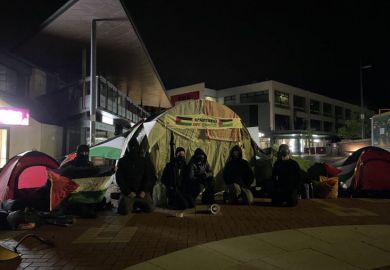Social contact is the key factor that can stop underprivileged students spiralling into depression, Australian psychologists say.
A study by researchers at the University of Newcastle has found that students who consider themselves of working-class stock feel isolated from their campus peers. This leaves them vulnerable to depressive symptoms that can hamper their studies.
“Social contact is the mechanism through which social class and mental health are linked,” study leader Mark Rubin concludes in a project report. “Social class determines the level of social contact students have at university, and social contact – or lack thereof – determines the level of mental health.”
The researchers asked about 750 first-year Newcastle undergraduates to rate their “perceived social status” by comparing their parents’ wealth, occupations and educational levels with those of other Australians. The students also indicated how much face-to-face, online or phone contact they had experienced with friends over the previous week.
More than 300 of the participants repeated the exercise several months later, allowing the researchers to “reach firmer conclusions about the causality”, Dr Rubin said.
“We’ve shown that time and money are the reasons why [working-class students] lack social integration, and that lack of social integration can have an impact on mental health,” he told Times Higher Education. “Research from the US shows that it can also be detrimental to their grades.
“With those types of outcomes, it needs to be taken seriously. If we can reduce social-class differences in social integration, maybe that will reduce social-class differences in mental health and grades.”
The team recommends interventions such as subsidising poorer students’ travel, accommodation, childcare and social events. It says that online social networking may also meet the needs of students poor in both time and money.
Co-researcher Olivia Evans, who has started a PhD investigating students’ mental health, conceded that any such intervention would have to be “organic”. “You can’t force social media on students – they won’t engage if they feel they’ve got the university watching over them.”
While working-class students may feel that they “don’t fit in” at university, Ms Evans said, the sense of isolation persists beyond the campus. Evidence suggests that many experience social isolation “even though they’re known for being community-based and dependent on one another”.
“There’s something about having less money and social status that doesn’t provide the things you need to forge strong connections and support networks,” she said.
Dr Rubin said that while the project had focused on students’ “subjective” social status, analyses using more conventional measures of socio-economic background had yielded similar results.
He said that when working-class people went to university, the culture shock was akin to visiting a foreign country. They experienced a “double hit” of the depression and stress sweeping students worried about their finances, grades and employment prospects.
“There’s a lot of mental health problems in the general [university] population,” he said. “For these working-class students, this minority group, it’s even worse.”
Register to continue
Why register?
- Registration is free and only takes a moment
- Once registered, you can read 3 articles a month
- Sign up for our newsletter
Subscribe
Or subscribe for unlimited access to:
- Unlimited access to news, views, insights & reviews
- Digital editions
- Digital access to THE’s university and college rankings analysis
Already registered or a current subscriber? Login










